Caryl Hart's Blog, page 7
February 13, 2018
Big Box Little Box Shortlisted for Klaus Flugge Prize 2018
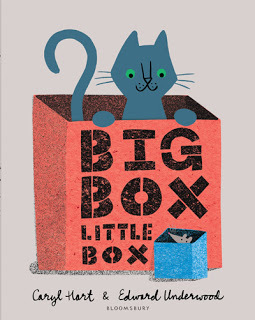 Big Box Little Box is illustrated by the hugely talented Edward Underwood. An experienced designer, Edward is half of the brilliant duo at Lisa Jones Studio in Lewes.
Big Box Little Box is illustrated by the hugely talented Edward Underwood. An experienced designer, Edward is half of the brilliant duo at Lisa Jones Studio in Lewes. This is Edward's first picture book and guess what? It's been shortlisted for the Klaus Flugge Prize for debut picture book illustrators!
This is fantastic news for both of us and for Bloomsbury, our publisher. Over 50 books were submitted and ours was among 15 chosen for the longlist.
The awards will be judged by:
Waterstones Children's Laureate and creator of Charlie and Lola, Lauren Child
Designer and art director Goldy Broad
Foyles Head of Children's Books, Charlotte Colwill
and Francesca Sanna, winner of last year's prize for her beautiful book, The Journey
The panel will be chaired by Julia Eccleshare, director of the children's programme of the Hay Festival. and the shortlist will be announced on 16 May.
The Klaus Flugge Prize is supported by the Association of Illustrators
Wish us luck!
EEK!
Published on February 13, 2018 08:03
Big Box Little Box Longlisted for Klaus Flugge Prize 2018
 Big Box Little Box is illustrated by the hugely talented Edward Underwood. An experienced designer, Edward is half of the brilliant duo at Lisa Jones Studio in Lewes.
Big Box Little Box is illustrated by the hugely talented Edward Underwood. An experienced designer, Edward is half of the brilliant duo at Lisa Jones Studio in Lewes. This is Edward's first picture book and guess what? It's been shortlisted for the Klaus Flugge Prize for debut picture book illustrators!
This is fantastic news for both of us and for Bloomsbury, our publisher. Over 50 books were submitted and ours was among 15 chosen for the longlist.
The awards will be judged by:
Waterstones Children's Laureate and creator of Charlie and Lola, Lauren Child
Designer and art director Goldy Broad
Foyles Head of Children's Books, Charlotte Colwill
and Francesca Sanna, winner of last year's prize for her beautiful book, The Journey
The panel will be chaired by Julia Eccleshare, director of the children's programme of the Hay Festival. and the shortlist will be announced on 16 May.
The Klaus Flugge Prize is supported by the Association of Illustrators
Wish us luck!
EEK!
Published on February 13, 2018 08:03
December 6, 2017
Innovation Fund Storymakers Project
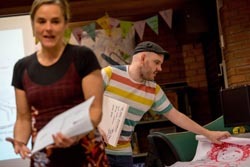 I am delighted be be working with Tameside Metropolitan Borough Council and Stone Soup on a fabulous project based in four libraries. The project aims to:
I am delighted be be working with Tameside Metropolitan Borough Council and Stone Soup on a fabulous project based in four libraries. The project aims to:- help get pre-school children school ready
- introduce parents to library services
- run regular interactive storytelling sessions for young families
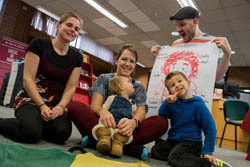 - work with families to create four picture books, one for each library
- work with families to create four picture books, one for each libraryFrom Spring 2017 to the end of the year, parents and their pre-school children have been attending weekly, high-energy storytelling sessions with Stone Soup's Simon Sullivan. These sessions include stories, songs and parachute games and are designed to help families access library services and find out more about enjoying books with their children.
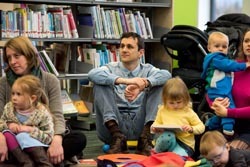 I began work on the project in September 2017, alongside Adam Pryce, a very versatile illustrator and designer who has worked on several school and community projects.
I began work on the project in September 2017, alongside Adam Pryce, a very versatile illustrator and designer who has worked on several school and community projects.Together we are working with families to create four linked picture books which include lots of actions and sounds to help very young children engage with books and stories. Parents have been involved at every stage and the feedback so far has been fantastic.
 The project concludes in February with a celebration event for everyone who has taken part. Every family will receive a copy of the book they have contributed to. Tameside MBC are also planning an exhibition, which will be mounted in Tameside Central Library, where members of the public will be able to find out about the project and see how the books were made.
The project concludes in February with a celebration event for everyone who has taken part. Every family will receive a copy of the book they have contributed to. Tameside MBC are also planning an exhibition, which will be mounted in Tameside Central Library, where members of the public will be able to find out about the project and see how the books were made.Find out more
Published on December 06, 2017 02:51
November 2, 2017
Whiffy Wilson in Swedish - DIY Translation!
 Story Time!Martina Minarik is a Whiffy Wilson super-fan dedicated to giving her children the very best start in life. She recently got in touch to let me know how much she loves Whiffy Wilson and my other books and sent me a darling recording of her two year old reading the story to her baby brother.
Story Time!Martina Minarik is a Whiffy Wilson super-fan dedicated to giving her children the very best start in life. She recently got in touch to let me know how much she loves Whiffy Wilson and my other books and sent me a darling recording of her two year old reading the story to her baby brother.But they are no ordinary family. Martina is bringing her children up bilingual.
Having left London two years ago for a new life in.. wait for it.. Bermuda (No, I am NOT jealous. Not one tiny little bit...) Martina now spends a lot of time reading with Emilie, 2 and Max who is six months old.
She says, "I speak Swedish with Emilie and Max. Raising children bilingual is hard especially when their dad and everyone else around us speaks English. Books and nursery rhymes are great tools for submerging them into the language, so we buy, ship and also download a lot of books."
Some of their books are in Swedish, but many are in English. These, Martina translates as she goes along. So she is reading in English and at the same time telling the story in Swedish. To a wriggling 2 year old. And a baby! How awesome is that?!
Martina says, "Emilie's favourites tend to be those books that are written in rhythm and rhyme, in a fairly simple language, with shorter sentences and humour. I suspect that’s why she enjoys Whiffy Wilson so much. But off the cuff translation is hard when there are rhymes and I want to expose her and Max to the best possible language and story, and to be respectful to the author."
So Martina decided to go one better. Not content with ad hoc translation, she decided to sit down and work through the whole of Whiffy Wilson, the Wolf who Wouldn't go to Bed and translate it properly into Swedish, rhymes and all!
 Martina's Notes
Martina's NotesShe says, "I found myself wishing Whiffy Wilson was available in Swedish, and one day decided to have a stab at translating it myself. Some paragraphs have come more easily, others I’ve worked on for hours and hours in order to maintain the story, humour, rhythm, rhyme, straight forward language and sentence length. It’s been such a puzzle and brain teaser! It's been SO satisfying and so much fun!"
She is now planning to contact some Swedish publishers to persuade them to publish more of my books in Swedish.
Martina, I salute you!
Published on November 02, 2017 05:16
September 28, 2017
Girls CAN do Anything!
I'm delighted to be publishing a book with Scholastic next year called Girls Can do Anything.
It's being illustrated by the wonderful Ali Pye, and will be aimed at very young children. As part of the process, my editor asked me to send her a paragraph on why I wanted to write the book. What came out was a *little* more than a single paragraph - but for once I wasn't particularly worried about word count! Anyway, I thought I'd share it with you too. So here it is:
I have always been a girl but have never felt completely comfortable as one. When I was growing up, my parents were endlessly encouraging and taught me that I could be anything I wanted to be, I just had to be determined and work hard. However, society did not agree and I felt constantly affronted and frustrated by everyday sexism. I was not allowed to wear trousers to school, even when it was snowing, because “girls don’t wear trousers,” I was not allowed to join the Cub Scouts, because girls had to be Brownies and learn about sewing and painting. Only boys were allowed to play with fire and poke things with sticks. I was not allowed to play football, or do woodwork. I could not grow up to be an astronaut, or a carpenter or a racing driver.
As I child, I had no positive female role models. All the best characters in books, films and on television were male. Girls like me, who loved climbing trees and building dens, were called tom-boys. We were not proper girls, or proper boys, but something in between.
As an adult, I assumed that this kind of insidious disapproval was a thing of the past. That society was much more fair - that women were now seen as equals. Until one day in 2014, when I saw an online campaign #Like a Girl, which really unsettled me. It highlighted how the term “like a girl,” is still used as an insult. And that really got me thinking. Why should it be an insult to throw like a girl, or run like a girl? Why was this term still very much in use in what I had thought were more enlightened times?
A year or so later, my thoughts were again jarred by a Sport England advert on television #ThisGirlCan. This ad really blew all my childhood conditioning out of the water. For the first time ever, I was seeing images of girls getting sweaty, and dirty and being aggressive - and this being a cause for celebration rather than ridicule. It was the first time I’d seen anything that so blatantly challenged the stereotypes I’d grown up with. And I was shocked at how much impact it had. Until then, I’d assumed that sexual stereotyping was a thing of the past. But seeing these powerful images lighting up my living room made me realise that society still thinks it’s unusual for a girl to play football, or fly a plane, or mend the road. We see very little women’s sport on television, even now. If I asked you who was the first British astronaut, you would likely say Tim Peake. But you’d be wrong. It was, in fact, a woman, called Helen Sharman, almost 25 years before. My sister-in-law, who is a Captain for Easyjet - is still regularly patronised with a “well done” by male passengers boarding her plane. It is totally shocking and unacceptable to me that women’s achievements are still belittled, ridiculed and ignored.
I realised that, as a children’s author, I had an opportunity to show our youngest children that the world belongs as much to girls as it does to boys. I wanted to demonstrate that girls are allowed and entitled to create a space for themselves wherever they choose - whatever their interests or passions may be, and for that to be okay. They don’t need to be called half-boys or less-than-girls, they can just be themselves and aspire to become anything they want to be. I wanted to show young children categorical proof that a girl can become an astronaut or a bus driver, a builder or a firefighter. I wanted to give girls confidence that their hopes and dreams, their interests and passions are not only acceptable, but are to be celebrated and applauded. And that’s why I wrote Girls Can Do Anything. Because I believe it is true.
It's being illustrated by the wonderful Ali Pye, and will be aimed at very young children. As part of the process, my editor asked me to send her a paragraph on why I wanted to write the book. What came out was a *little* more than a single paragraph - but for once I wasn't particularly worried about word count! Anyway, I thought I'd share it with you too. So here it is:
I have always been a girl but have never felt completely comfortable as one. When I was growing up, my parents were endlessly encouraging and taught me that I could be anything I wanted to be, I just had to be determined and work hard. However, society did not agree and I felt constantly affronted and frustrated by everyday sexism. I was not allowed to wear trousers to school, even when it was snowing, because “girls don’t wear trousers,” I was not allowed to join the Cub Scouts, because girls had to be Brownies and learn about sewing and painting. Only boys were allowed to play with fire and poke things with sticks. I was not allowed to play football, or do woodwork. I could not grow up to be an astronaut, or a carpenter or a racing driver.
As I child, I had no positive female role models. All the best characters in books, films and on television were male. Girls like me, who loved climbing trees and building dens, were called tom-boys. We were not proper girls, or proper boys, but something in between.
As an adult, I assumed that this kind of insidious disapproval was a thing of the past. That society was much more fair - that women were now seen as equals. Until one day in 2014, when I saw an online campaign #Like a Girl, which really unsettled me. It highlighted how the term “like a girl,” is still used as an insult. And that really got me thinking. Why should it be an insult to throw like a girl, or run like a girl? Why was this term still very much in use in what I had thought were more enlightened times?
A year or so later, my thoughts were again jarred by a Sport England advert on television #ThisGirlCan. This ad really blew all my childhood conditioning out of the water. For the first time ever, I was seeing images of girls getting sweaty, and dirty and being aggressive - and this being a cause for celebration rather than ridicule. It was the first time I’d seen anything that so blatantly challenged the stereotypes I’d grown up with. And I was shocked at how much impact it had. Until then, I’d assumed that sexual stereotyping was a thing of the past. But seeing these powerful images lighting up my living room made me realise that society still thinks it’s unusual for a girl to play football, or fly a plane, or mend the road. We see very little women’s sport on television, even now. If I asked you who was the first British astronaut, you would likely say Tim Peake. But you’d be wrong. It was, in fact, a woman, called Helen Sharman, almost 25 years before. My sister-in-law, who is a Captain for Easyjet - is still regularly patronised with a “well done” by male passengers boarding her plane. It is totally shocking and unacceptable to me that women’s achievements are still belittled, ridiculed and ignored.
I realised that, as a children’s author, I had an opportunity to show our youngest children that the world belongs as much to girls as it does to boys. I wanted to demonstrate that girls are allowed and entitled to create a space for themselves wherever they choose - whatever their interests or passions may be, and for that to be okay. They don’t need to be called half-boys or less-than-girls, they can just be themselves and aspire to become anything they want to be. I wanted to show young children categorical proof that a girl can become an astronaut or a bus driver, a builder or a firefighter. I wanted to give girls confidence that their hopes and dreams, their interests and passions are not only acceptable, but are to be celebrated and applauded. And that’s why I wrote Girls Can Do Anything. Because I believe it is true.
Published on September 28, 2017 05:16
August 31, 2017
Do you love dinosaurs? Course you do!
 Who doesn't love dinosaurs? And I bet your children know a whole lot more about them than you do! Well I've just uploaded some fantabulous dino-tastic fun activities to accompany my book Knock Knock Dinosaur.
Who doesn't love dinosaurs? And I bet your children know a whole lot more about them than you do! Well I've just uploaded some fantabulous dino-tastic fun activities to accompany my book Knock Knock Dinosaur. They've been developed in partnership with the amazingly clever-tastic Zoe Toft from Playing by the Book and you can check them out here for absolutely FREE!
 Get your hands on a copy of Knock Knock Dinosaur from your local book shop or library, or buy a signed copy from me here and then get busy with these great activities. They're educational too, but shh don't tell the kids!
Get your hands on a copy of Knock Knock Dinosaur from your local book shop or library, or buy a signed copy from me here and then get busy with these great activities. They're educational too, but shh don't tell the kids!Knock Knock Dinosaur is illustrated by Nick East. Isn't he amazing?! Watch out for more Knock Knock books coming soon.
Published on August 31, 2017 10:55
August 30, 2017
FREE Activities to enhance your stories
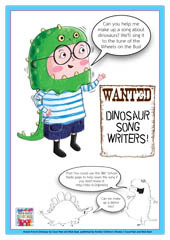
Enjoying a book isn't just about reading a story. Reading books together with your children can give them - and you - so much more. I do a lot of work in schools and libraries with children, teachers and parents and design lots of activities to accompany my books that help kids get the most out of their reading experiences. These might include writing stories using my characters, making up songs about them, or creating their own games based on the book's theme.
Many of these activities are available for you at home, free of charge. Just visit my website and go to Activities and Downloads for a huge range of free downloadable creative fun and games that will enhance your reading experience with your child or children.
Published on August 30, 2017 03:55
May 17, 2017
Fractured Fairy Tales
 Traditional fairy tales are the bread and butter of many young readers' diet. Passed down from parents to children over many generations, they are the stories that stick with us as we grow and are so embedded in the western European culture that many of us can quote at least one refrain from a favourite tale and would probably struggle to imagine a childhood without them.
Traditional fairy tales are the bread and butter of many young readers' diet. Passed down from parents to children over many generations, they are the stories that stick with us as we grow and are so embedded in the western European culture that many of us can quote at least one refrain from a favourite tale and would probably struggle to imagine a childhood without them.As our society becomes more multicultural I wonder whether stories from other cultures are becoming more widely known in schools? Certainly when I've approached publishers about exploring traditional tales from other cultures, I've generally been met with the "there's not a big enough market," sort of comment, which I find rather disappointing and hard to believe.
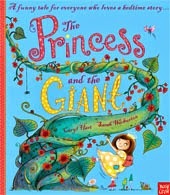 Anyway, as far as European tales go, many authors enjoy playing about with these stories and re-writing them with a modern twist or turning things upside down and back to front. The children I work with in schools LOVE messing about in the fairy tale world and creating crazy, ridiculous stories of their own. It's great fun and anything is possible when you inhabit a world of fire-breathing dragons and hungry talking bears.
Anyway, as far as European tales go, many authors enjoy playing about with these stories and re-writing them with a modern twist or turning things upside down and back to front. The children I work with in schools LOVE messing about in the fairy tale world and creating crazy, ridiculous stories of their own. It's great fun and anything is possible when you inhabit a world of fire-breathing dragons and hungry talking bears.I've written a few myself - all published by Nosy Crow, each of which challenges some aspect of the traditional fairy tale world. In my books I like to subvert traditionally gender-specific roles and challenge the central premise of many fairy tales that princesses are pathetic and need rescuing and that anything different is bad and must be thwarted as quickly as possible. My princesses do not dream of marriage and the happy ever after. They are brave and feisty and independent - as any self-respecting girl should be!
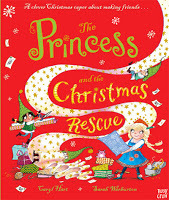 Joanne Norland, of Mumswrite, has written a very interesting blog about the emergence of fractured fairy tales in children's literature. She interviews me, Jonathan Emmett and Leigh Hodgkinson in a very thought-provoking article. Have a read of it here.
Joanne Norland, of Mumswrite, has written a very interesting blog about the emergence of fractured fairy tales in children's literature. She interviews me, Jonathan Emmett and Leigh Hodgkinson in a very thought-provoking article. Have a read of it here.For anyone who is interested in such things, it's also very enlightening to read the original versions of these stories, recorded by the Grimm Brothers and others. Many are very different to the stories we know today and FAR more gruesome!
So if you have some spare time, pick up a fairy tale and have a go and re-writing it yourself!
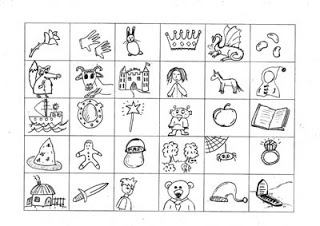 Here's a fun activity to get you going:
Here's a fun activity to get you going:Visit the Activities and Downloads section of my website and print out a copy of the Traditional Tales Grid.
Cut out the images and place them face-down on the table. Pick one square at random. This is the start of your story. Then pick 4 more squares and see if you can create a fairy tale-ish kind of story as you go along. It's a great game to play with kids.
I will be playing a live version of this game at the Wychwood Festival in Cheltenham on Friday 2 June so do come along and have some fun!
Published on May 17, 2017 01:54
May 8, 2017
NEW! Knock Knock Dinosaur Activites
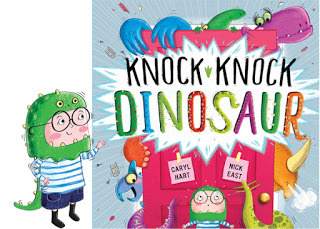 I am delighted to bring you the second of five brand new FREE Knock Knock Dinosaur activities to delight your little ones and keep those little fingers and minds busy!
I am delighted to bring you the second of five brand new FREE Knock Knock Dinosaur activities to delight your little ones and keep those little fingers and minds busy!Developed in partnership with the uber-creative Zoe Toft this first activity is a fabulous cut and colour dinosaur counting puzzle!
Download it now from my Activities and Downloads page. And watch out for more fab fun coming soon!
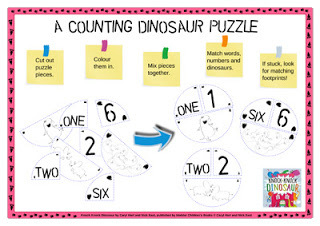
Published on May 08, 2017 05:11
March 28, 2017
NEW! Let's Go to Nursery Activities
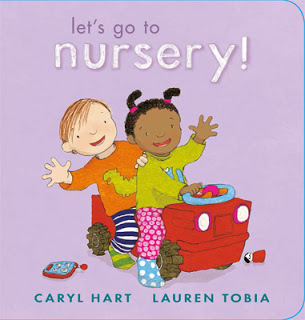 Bee and Billy
Bee and BillyBilly and Bee
See what they can do
They're so tumbly
Wiggly, jumbly
Can you do it too?
We have created some gorgeous new FREE activities to accompany this, the first in a series of four first-experiences books. Head over to the Activities and Downloads section to get yours!
Thanks to Lauren Tobia and Zoe Toft for their help!
Published on March 28, 2017 08:57



